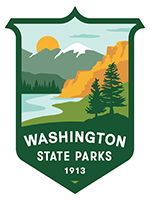Press Release
July 14, 2022
State recognizes Paddle Safe Week July 23 - 29
OLYMPIA – July 14, 2022 – Washington State Governor Jay Inslee has issued a proclamation declaring the week of July 23-29 to be statewide Paddle Safe Week. In partnership with the Washington State Parks Boating Program, Paddle Safe Week will lead a statewide effort to create a culture of safety around paddle sports. The campaign recognizes that Washington's diverse waterways require different skills, preparation and safety equipment.
In the last five years, paddlers have come to represent 55% of the statewide recreational boating fatalities. The relatively unstable nature of paddlecraft and lack of safety education have contributed to this shift.
To kick off the week, the Boating Program will return to T-Mobile Park on July 24 to ask Mariners Game attendees to sign a kayak and pledge to paddle safely. The campaign invites all paddlers to take the Washington Safe Boating Pledge at BoatSafeWA.Org.
“Paddle Safe Week is a great opportunity to help reduce paddle sports-related fatalities by sharing resources and educating the community on how to recreate safely,” said Boating Program Manager Rob Sendak. “Paddlers should know that kayaks, canoes, and stand-up paddleboards (SUP) are subject to boating laws and regulations.”
Sendak urges all participants to boat responsibly to prevent accidents, minimize impacts and avoid conflicts with other boaters.
The Washington State Parks Boating Program maintains a collection of free digital safety resources and information for paddlers. The single, most important way to paddle safely is to always wear a life jacket on the water. The program recommends the following safety practices:
Get Educated – Find classes through local clubs and outfitters, city and county parks and recreation departments, and online.
Wear a Life Jacket – This recommendation bears repeating. Age and skill level notwithstanding, wear a life jacket out on the water. State law requires all vessels, including canoes, kayaks and stand-up paddleboards to have at least one properly fitted Coast Guard-approved life jacket for each person on board.
Always use a SUP Leash – Stay tethered to the paddleboard for extra flotation and a chance to stay alive in an accident. For stand-up paddlers a leash is a necessity.
Carry Essential Gear – Carry the essentials for safety, emergency communications and comfort.
Check and Understand the Weather – Check the weather frequently before and during each trip, keeping an eye on current conditions and forecasts.
Protect Against Cold Water Shock – Avoid the biggest risk, which is not hypothermia but cold-water shock. Cold water shock occurs in the first stage of immersion (from an accidental fall overboard). Be prepared. Wear a life jacket.
File a Float Plan – Before heading out, study the intended route, and let someone know the plan.
Paddle with a Group – Go out with at least three people and stay close enough for visual or verbal contact.
Avoid Alcohol and Drugs – Stay alert and maintain situational awareness. These are key for safety on the water.
Learn how to self-rescue – Know how to get back in or on the craft. Paddlecraft are typically safe, but there's a higher risk of going overboard and becoming an accidental swimmer.
Label Paddlecraft – Use a sticker or some other means to provide contact information for privately owned paddlecraft. When empty paddlecraft are found adrift, it's assumed someone is in danger. Calling the owner of a craft found adrift can help prevent unnecessary searches and free up resources.
Be Visible to Other Boaters – Paddle to be seen. Wear bright neon and contrasting colors, put highly reflective tape on paddles, use a flagpole and carry a bright light.
Through funding provided by the No Child Left Inside Grant, the Washington State Parks Boating Program has partnered with organizations across the state to pilot a new Paddle Safe curriculum. This summer, over 200+ kids will spend a day outside, learning safe paddling skills and getting out on the water with skilled instructors. They are fitted with a Coast Guard-approved life jacket, which they take home with them at the end of the day. Participants learn valuable water competencies and as part of a concerted efforts from a coalition of water-safety agencies to reduce boating fatalities and accidents.
As the program grows, it seeks to expand access to more communities across the State. For questions about the program or to get involved contact boating@parks.wa.gov.
News media contact:
Ashley Seydel, Boating Program Communications Consultant, (360) 790-5317
ashley.seydel@parks.wa.gov media@parks.wa.gov
About the Boating Program
The Washington State Parks Boating Program administers several programs to keep boaters safe and informed of applicable regulations. In addition to Recreational Boating Safety, the Boating Program trains and certifies Marine Law Enforcement programs across the state and administers the Clean Vessel Act to fund pumpout stations that keep Washington waters clean.
About Washington State Parks
The Washington State Park Commission manages more than 100 state parks and properties totaling approximately 120,000 acres. The Commission provides a variety of recreation opportunities for citizens and provides stewardship protection for a diverse array of natural, cultural and historic resources. State Parks’ statewide programs include long-distance trails, boating safety and winter recreation.
